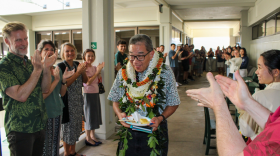A Hawaiʻi pilot project to safely return students and teachers to campuses this fall is getting a $3 million boost from the National Institutes of Health.
The community-based model was successfully tested at Kamaile Academy on Oʻahu this spring, combining a culturally appropriate curriculum with COVID-19 testing to create an educational climate of safety.
Kamaile Academy Principal Paul Kepka says he was looking for guidance on safely resuming in-person learning at his Waiʻanae public charter school when he joined a pilot project offering free on-site COVID-19 testing to teachers and staff.
"I think our staff just really felt comfortable knowing that each week those that wanted to be tested could be tested so that we could focus on the most important things which were teaching and learning," he said.

Over three months, more than 80% of Kamaile’s 120 staff and teachers were tested by workers from the nearby Waiʻanae Coast Comprehensive Health Center.
Nearly 90% said the program promoted a better understanding of the need for antigen testing. And 52% said they were more likely to be vaccinated as a result.
Dr. May Okihiro, pediatrician and research director at the Waiʻanae health center, says testing remains a key component in preventing community spread of the virus, especially in communities with lower vaccination rates.
"We know that 40% of infections are asymptomatic. And so by making tests just be a part of the regular routine process of what they do every week, we can help ensure that schools remain safe," Okihiro said.
The pilot project didn’t only involve testing, it also offered a culturally appropriate curriculum. Principal Kepka says the educational piece was critical to engaging students at his Hawaiian-focused public charter school.
"I think the modules were designed to really connect with our kids," Kepka said. "Our teachers found them valuable because we know that our children could relate and their families could relate, especially, I think, in the area like keeping our ohana and our in our bubble safe."
Pauline Chinn, a curriculum studies professor at the University of Hawaiʻi, designed the material to include a history of infectious diseases in Hawaiʻi, the impact this had on Native Hawaiian families, and public health policies implemented under the Hawaiian Kingdom.
"The key to engagement is a student being able to see himself or herself in what they're learning. So this gives a historical and a real perspective when people can hear the voices of their ancestors," Chinn said.
The Pacific Alliance Against COVID-19 pilot project is gearing up to expand beyond Kamaile Academy, offering $200 to teachers K-12 interested in bringing the model to their school.
PAAC is a multidisciplinary team of researchers at the University of Hawaii and the AHARO Community Health Centers. For more information, visit ww.paac.info.
HPR reporter Ku‘uwehi Hiraishi also appeared on The Conversation on July 7, 2021.




